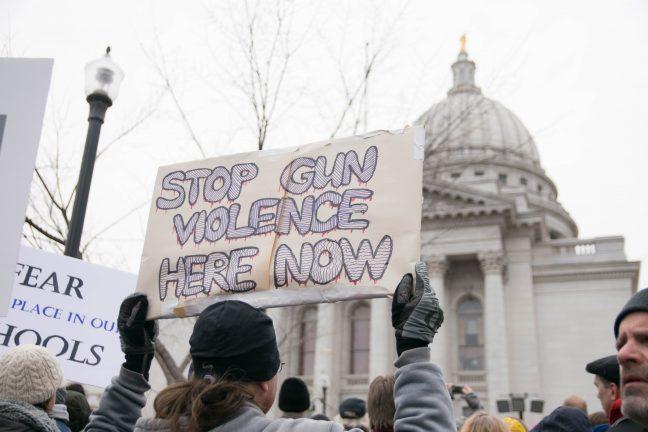When Democrats in the U.S. House of Representatives passed HR 1, Wisconsin Democrats and Republicans voted along party lines for a number of amendments to the bill. Only one legislator, Rep. Mark Pocan, D-Madison, voted on an amendment that would lower the federal voting age from 18 to 16. While the amendment failed, Pocan’s vote is part of this society’s unceasing struggle to give more Americans access to its most crucial political institution — the vote.
Pocan’s vote on the amendment was his answer to what is, intrinsically, a question of justice — and a question about how power should be distributed in a democratic society. Young people are a political coalition based on a shared identity — age — whose demands can only be expressed outside the voting booth. Giving 16 and 17 year-olds the ability to vote would give young people a formal — that is electoral — outlet for their political demands, which, judging by contemporary movements, are numerous and far-ranging.
Obviously having political demands can’t be the only prerequisite for electoral inclusion, but there is something unique about the political engagement of young Americans now.
Political integrity is vital to democracy — discourse on Twitter must not be an exception
Young people are exposed to much more information about their political system than they were in the past, so they become politically conscious and politically active much earlier in their lives than young people in previous generations. With this consciousness comes the recognition that their interests aren’t being formally represented.
March 24, 2018, young survivors of gun violence, most prominently students from Parkland, Florida, led the March for Our Lives. The nationwide demonstration, which called for stronger gun violence prevention measures — universal background checks on gun sales, closing gun shows, restoring the ban on assault weapons — drew at least 1.2 million protesters, many of them young people. It was one of the largest protests in American history.
Consistently, the organizers of the movement, almost all of whom were under 18 and unable vote, described their political demands in terms of their age and their identity as students. They called on Americans, young and old, to mobilize for the lives of young people who live under the constant threat of gun violence they had no role in creating. Emma Gonzalez, a student and survivor of the Parkland massacre, described the organizers as “speaking in the most influential way they know how: Civil disobedience, marching in the streets with signs and chanting truth to power.”
Student city council candidates provide valuable insight, representative leadership
Young Americans aren’t just mad that they’re the victims of horrid public policy choices — they’re mad they have no formal place to speak their truth. To many disgruntled young people, that formal place is the ballot box.
Increasingly, young Americans are mobilizing against climate change, knowing they will bear the future consequences of environmental decisions. March 15, tens of thousands of young people from 112 countries, most of whom were under 20, walked out of school in a global climate strike.
Recognize, too, that U.S. citizens or “resident aliens” at least 17-years-old may enlist in the military with parental approval. In most states, citizens or residents can obtain their driver’s license at age 16. If young people are given these other social privileges, they should have a voice in deciding who set military, infrastructural and highway policy.
Lower voting age encourages civic action, habitual nature of voting
The colloquial objection to lowering the voting age is that young people, who are traditionally dependent on their parents or guardians, will be entirely influenced by the politics of the adults in their life. They’ll just “vote the way their parents do.” If young people can’t make political decisions of their own, why give them electoral power?
The assumptions embedded in this objection — that people who cannot make their own political decisions should be excluded from the democratic process — has a long and pernicious history. The specter of the “misinformed voter” has been raised every time the U.S. resolves in give more people the ballot.
These assumptions have also been thoroughly debunked by psychologists, who say that teenage brains are developed enough to make informed political judgments. Psychologists often distinguish between “hot” and “cold” cognition. Hot cognitive abilities are the ones people rely on when they are emotionally aroused, in groups or in a hurry, and cold cognitive abilities are the ones people use when they are calm and have time to deliberate and use logical reasoning. Because making political judgments and voting are considered forms of cold cognition and research suggests that cold cognitive skills are firmly in place by age 16, young people shouldn’t be denied the vote.
Campus leaders advocate for out-of-state student voting rights
And increasingly, the political and cultural information young people are basing their opinions on isn’t vetted to them by the adults in their lives. Young people have more agency than ever to form political opinions without the help of adults or older people. More often than not, their politics reflect the realities of their circumstances — when confronted with climate catastrophe and the horror of gun violence.
The purpose of a democratic society must be to involve the most people in the process of governing, of which elections is a crucial part. This means including everyone with relevant political demands in electoral politics. Even the youngest among us.
Sam Ropa ([email protected]) is a senior majoring in geography and anthropology.




















